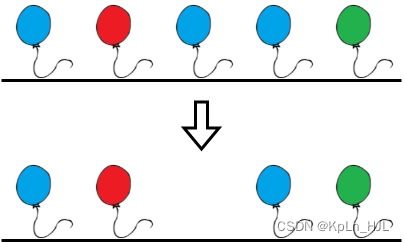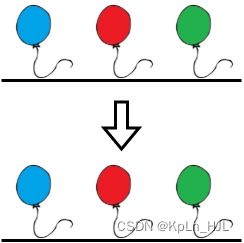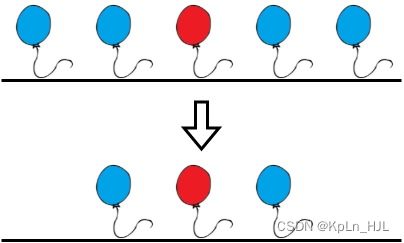leetcode - 1578. Minimum Time to Make Rope Colorful
Description
Alice has n balloons arranged on a rope. You are given a 0-indexed string colors where colors[i] is the color of the ith balloon.
Alice wants the rope to be colorful. She does not want two consecutive balloons to be of the same color, so she asks Bob for help. Bob can remove some balloons from the rope to make it colorful. You are given a 0-indexed integer array neededTime where neededTime[i] is the time (in seconds) that Bob needs to remove the ith balloon from the rope.
Return the minimum time Bob needs to make the rope colorful.
Input: colors = "abaac", neededTime = [1,2,3,4,5]
Output: 3
Explanation: In the above image, 'a' is blue, 'b' is red, and 'c' is green.
Bob can remove the blue balloon at index 2. This takes 3 seconds.
There are no longer two consecutive balloons of the same color. Total time = 3.
Input: colors = "abc", neededTime = [1,2,3]
Output: 0
Explanation: The rope is already colorful. Bob does not need to remove any balloons from the rope.
Input: colors = "aabaa", neededTime = [1,2,3,4,1]
Output: 2
Explanation: Bob will remove the ballons at indices 0 and 4. Each ballon takes 1 second to remove.
There are no longer two consecutive balloons of the same color. Total time = 1 + 1 = 2.
Constraints:
n == colors.length == neededTime.length
1 <= n <= 10^5
1 <= neededTime[i] <= 10^4
colors contains only lowercase English letters.
Solution
Heap
Go through the balloons, if the color is different than the previous one, handle the previous one. Because if there are 3 consecutive balloons, we have to remove 2 of them, so use a heap to store all the time, and pop until the length of the heap is only 1.
Time complexity: o ( n log n ) o(n\log n) o(nlogn)
Space complexity: o ( n ) o(n) o(n)
Reduced from heap to numbers
Use a sum to store all the time, and the effort should be the sum - maxValue
Time complexity: o ( n ) o(n) o(n)
Space complexity: o ( n ) o(n) o(n)
Code
Heap
class Solution:
def minCost(self, colors: str, neededTime: List[int]) -> int:
heap = []
prev_b = None
res = 0
for i in range(len(colors)):
if colors[i] != prev_b:
if prev_b:
while len(heap) > 1:
res += heapq.heappop(heap)
heapq.heappop(heap)
prev_b = colors[i]
heapq.heappush(heap, neededTime[i])
while len(heap) > 1:
res += heapq.heappop(heap)
return res
Reduced
class Solution:
def minCost(self, colors: str, neededTime: List[int]) -> int:
res = 0
cur_sum = 0
max_val = 0
prev_b = None
for i in range(len(colors)):
if colors[i] != prev_b:
if prev_b:
res += cur_sum - max_val
cur_sum = 0
max_val = 0
prev_b = colors[i]
cur_sum += neededTime[i]
max_val = max(max_val, neededTime[i])
res += cur_sum - max_val
return res


